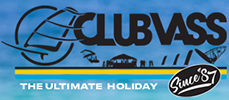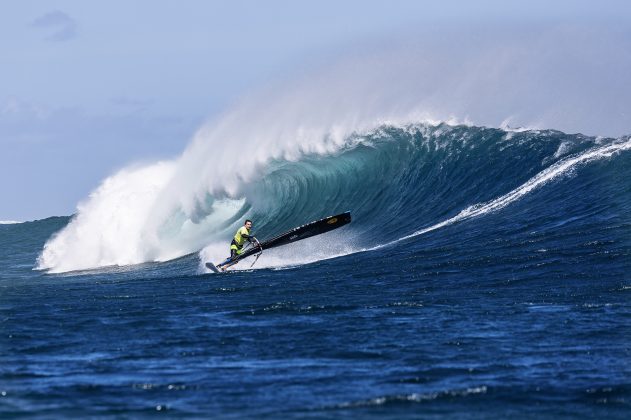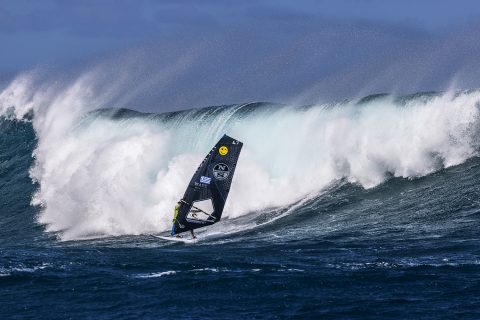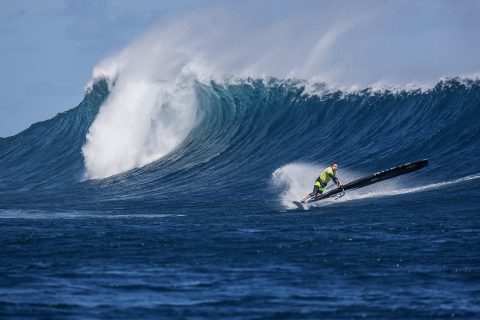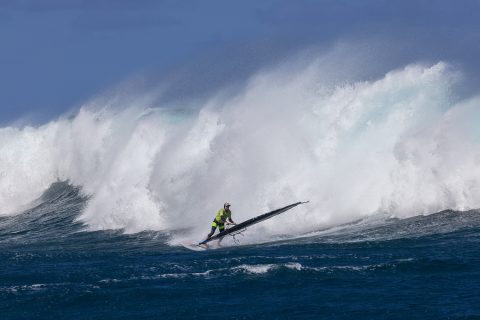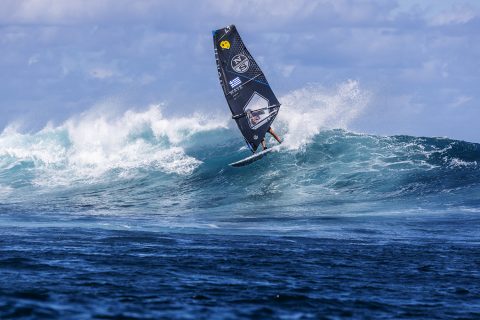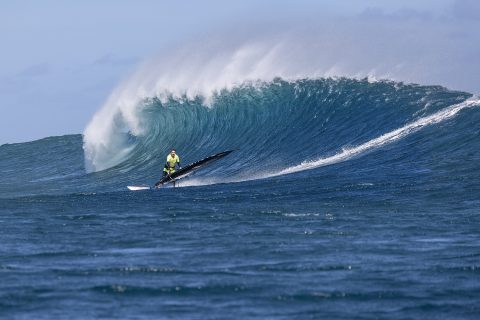NIKOS KAKLAMANAKIS: DARE TO DREAM
After an incredible racing career spanning over five Olympics, highlighted by winning Gold in Atlanta in 1996 and Silver in Athens in 2004, Nikos Kaklamanakis finally decided to hang up his racing harness in 2009 and follow his childhood dream to ride waves. John Carter caught up with Nikos in Mauritius to hear a few highs and lows of his incredible windsurfing journey.
Words: Nikos Kaklamanakis // Photos: John Carter
I came from a middle-class family in the middle of Athens and my childhood dream was to live close to the ocean. My dad found windsurfing through a tourist and practiced it himself and competed too! He introduced it to me without pushing me, to help me escape from my ‘no brakes approach’ to football and bikes that cost me quite a few injuries when I was young. I was a bit reckless. My father decided to put me in the ocean and I started out getting into swimming for two years. When I was eleven, I took up windsurfing and was immediately hooked. I loved watching videos of the guys riding waves in Hawaii and I dreamed that I would be able to do that one day. In my mind, I had one option to achieve this goal and this was through racing at the Olympics! I dreamed that if I could do well at the Olympics, this could provide me a life changing opportunity. The format meant the same equipment for all, so everyone had an equal chance. My father encouraged me to act upon my dream and supported me to start racing. I am very grateful my father helped encourage me to follow my dream.
- Nikos on the outer reefs in Mauritius
Positive action
Back in 1988, the son of a politician’s friend took my place at the Seoul Olympics. I was nineteen and had won the Olympic selection. I missed the Olympics unfairly through no fault of my own, as there was a level of corruption involved and there was a big scandal about it. I had no intention or time for a pity party, instead I decided to do something about it! This brought the best out of me in the long run and rather than dwell on the negative side of missing out, I trained even harder for the next Olympics four years later. It was an awakening from a moment of failure due to the unfair defeat I suffered. I decided to change my destiny, to make something good from a bad scenario. I was deprived from competing at the Olympics and had to work for eight years before I eventually won my gold medal. I think the fact I never made the Olympics in 1988 made me hungrier and more determined to succeed, and as a consequence, I pushed myself to the limit.
- Nikos drops in
Olympics
Barcelona 1992 was my first Olympics, but I had been training alone in Greece, I had no support at all and I was hesitant to invest to the max of my only capital left: my body and soul! I finished 9th. My life was fully devoted to my Olympic campaign for Atlanta 1996 though, I found a few sponsors and started travelling abroad training with the best, this was a game changer!
I won the Olympics in 1996 in Atlanta; that was a fantastic experience. I won four races out of the eight I competed in. I did not need to race in the last race as I had already won on points. I was a part of five Olympic games and was also in the top six in the world championships for twelve consecutive years and I won three gold medals there also. I came from a small country and this all came from a bad experience in life, which I turned into a good one. Winning is a choice in your life, destiny does not come to you, you go to it! After winning gold in Atlanta, I served as the flag bearer for Greece at the closing ceremony, and also four years later at the Sydney 2000 opening ceremony.
- Chasing waves
Honour
At the 2004 Olympics I was given the distinct honour of lighting the Olympic cauldron in Athens, which was viewed by over two billion people. It was such a huge moment of satisfaction that windsurfing was the highlight of the Olympic centre stage while I lit the cauldron. To me personally it came as an incredible highlight, after all I had been through. Sometimes if you follow your dream, you never know what you can achieve. I just worked hard for the pure love of what I was doing. My original goal was just to live by the ocean and then my father bought me a one-design windsurfer and I ended up having this amazing life. It has gone so much further than my dreams.
Tactics
Many people tried to work out what the secret was to my success. I trained relentlessly over the years building up to the Olympics, in all conditions and, when I was young, even at night, under the moonlight, which helped increase my feeling of the wind and waves. One of my mottos is, ‘what we do under the shadows, brings us out into the light’ and it came from the night sailing. I was fully planing in the silver light of the moon even in strong gusty offshore winds. This really helped my senses to develop a feel for the ocean and the wind. I did not care what the other athletes were doing, I was focusing on myself.
I also was one of the first to use longer harness lines and also putting them close to each other. This was great for harness pumping and it was better for sailing over and underpowered. I spent hours tuning and trimming everything I could within the rules. In 1996 the Olympic masts given by draw to competitors had an uneven pre bent curve. I figured if I rotated the top part of the mast a few degrees, I would create a customized side bend different on each tack and I was flying in my tests. My tuning gave me a different twist, from one tack to another, without touching my adjustable downhaul as much as usual. I had more twist against the choppy waves on starboard going upwind and less on port tack with waves on my side. I had made an opportunity out of a problem.
But the main reason for my victory was down to my tactics and strategy, plus the use of extreme currents in the Olympic race area. The heat was exhausting with temperatures around 30 degrees in 70 plus per cent humidity for the brutal pumping races – the so-called ‘pumpathons’! I was fit and had trained for this heat and that was the critical difference maker.
When I was competing in the Athens and the Beijing Olympics, I was the oldest athlete in my category. In August of 2009, I won my final world championship gold medal in the raceboard masters competition at the IWA windsurfing world championships in my favourite windy conditions at Weymouth. That was a great way to close my career and it was such a beautiful memory. Life is so sweet after seven Olympic campaigns; five Olympics I took part in plus the one they took away from me, also one as a coach in Tokyo!
- Slash of the lip from Nikos
Waves
I was so dedicated to training and competing in the Olympics, that I allowed myself only around three weekends per year for wave sailing! I was doing stalled-forward killer loops in 1993 based more on bravery than technique and finesse. These were dangerous and I feel lucky I survived with just a few broken in half boards.
It was not until I finished racing, that I came back to my initial motivation from when I was a kid: to ride the waves. I guess dreams never die, they just multiply! I am not afraid of the waves, they are my energy and power, the only thing that scares me is to live a normal life away from the sea!
I would call Mauritius my second home now! I have so many family memories and friends I have made while out riding waves together. I think the island has the best total set-up in terms of wave, speed and quality, although it can be too busy most of the time in peak season. For remoteness, I love Gnaraloo in Western Australia and the outer reefs in New Caledonia, which you need a boat to access. I love the island of Sal in Cabo Verde and also Pacasmayo, Peru, for the amazing long rides that are one to two minutes long at least! I love sailing in Crete, I call one spot I discovered ‘Ponta Creta’ and we sail at Falassarna and some other secret spots. This is my European winter shelter to get my wave sailing fix with logo to mast high plus waves and side to side-off winds, it’s perfection, with two to four days out of every ten on a good winter.
Wave tuning
My background was all about tuning everything possible that was allowed by the rules and I tried to avoid this in wave sailing initially, apart from the usual fins, mastfoot and boom position and footstraps etc. But I found that even wave sails have extra gears hidden, to the point that justified a development of an adjustable mini outhaul and downhaul system, which was a downscaled version of my Olympic system. I have used it in all of my wave sails for years, but with the North Wave 3Di 4.7m, especially for a loner like me sailing in the outer reefs of Mauritius in two-hour plus sessions going through channels, the adjustable outhaul and especially the downhaul, offers me a huge range. A North 4.7m Wave 3Di can feel like a 4.5m down the line but also feels like a 4.9m – 5.0m going back out upwind when less tension is applied. I can even adjust drive to pivot ratio, on-off ability too from wave to wave. I can’t wave sail without it now!
Waves versus racing
There is no direct comparison of Olympic training and racing brutality versus the pure pleasure and feeling of wave sailing. Indirectly they relate though in key points like competing with myself more than trying to beat others! In racing and waves, you need to listen and react to the ocean, but mostly assess your risk management and handle your emotions. I do find my adrenaline and emotions can be similar to winning an Olympic race, after a pedal to the metal, no holding back ride at the infamous ‘One Eye’ that ends well! Although, not always, I have lost two full rigs in ten years on that reef. I find myself screaming from excitement, with my neurotransmitters firing on a good day of wave sailing. From the moment I downhaul my sail on land, to smelling the ocean, to hearing pounding waves while crossing the channel and finally taking a bomb set. That is one of the feelings that makes me happy these days and I am always motivated to experience this.
Public speaking
I started public speaking at schools and sporting clubs from 2003, just as a social responsibility, and then professionally at corporate events from 2013. I currently do many speeches at schools, as well as around seven bigger corporate events a year. I enjoy it so much and I feel thankful and privileged to inspire others from true-life examples of my life. In 2015, one 12-year-old school kid wrote me a letter afterwards confessing that she gave up on trying anything in her life after her young sister died from cancer, only to announce to me that she will fight again for her dreams after my visit to her school. That is a life changer to me and a purpose worth dreaming and living for! I was always a bit of a loner when I competed and decided to step into my fears again and out of my comfort zone with public speaking.
Ambition
My ambition now is to keep inspiring and helping people in need. I am the leader of a huge campaign for anti-corruption in Greek sports federations that is making waves already and I am also raising a happy and talented daughter and we love to share smiles. Last but not least, I want to let my heart beat right next to the ocean’s heartbeat of wind and waves!
- In the pit
Looking back
I don’t miss the Olympic campaigns anymore. I am not jealous, but instead I admire and respect present and future Olympians. I know that the desire, dedication and reasons needed in the road for gold can definitely be the best way to reinvent and explore myself psychologically, physically and spiritually. All those qualities can be transferred into other areas of my life that I enjoy to the max, from raising a daughter, motivational speaking to searching for and riding waves that never let the child in me go away. You can achieve anything if you set your mind to it, and if you desire, respect and love it, way more than you fear it, and back it up with consistent dedication.

